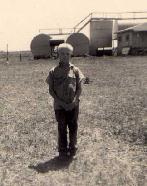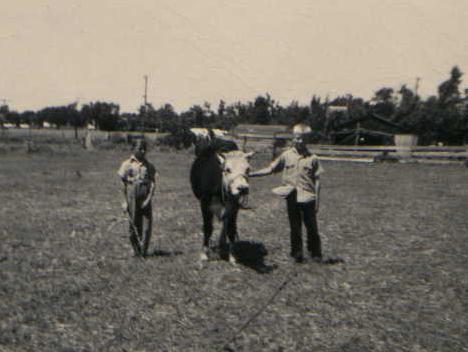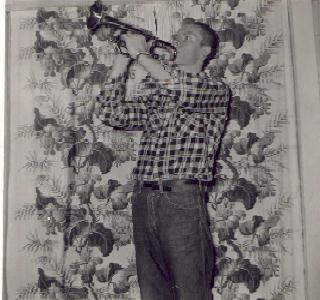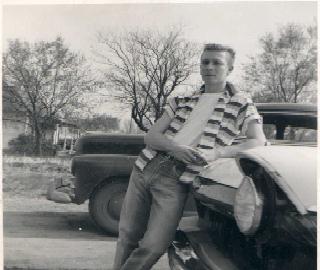The Early YearsBy Beryl DarrahLife is sort of like a journey. Sometimes is moves along quickly, almost a blur, with the scenery and surroundings changing rapidly and constantly. One must keep the eyes focused on the road ahead in order to maneuver the turns and curves in the road ahead. If one wants to know where he has been, he must constantly glance in the rear view mirror, otherwise the past will be lost without a memory. But there are times in all journeys when the pace slows down, perhaps at the end of the day, to refill with fuel, or maybe for an extended visit. In cases like these, roads are travelled again and again, new sights become familiar, the strange becomes commonplace, and sometimes excitement turns to boredom. No longer does one have to consult the map to find the way. No longer does one marvel over exotic, foreign surroundings. In times like these, exploration can take place at a more leisurely pace to seek out details not readily visible to the casual observer. Or, perhaps, there is no more exploring to be done; or if there is exploring to be done, it takes more effort and often yields results which were best left unknown. There are times in my life which fall into each of these categories. My journey started several years ago in Lyons, Kansas, back when cars were bigger and more powerful, when gas was cheap, when there were few, if any, speed laws, when highways were narrower and the Interstates were something yet to be built. The First World War had ended, but the Korean War hadn't begun. I was born in Lyons, Kansas and grew up on
a small farm. I had two brothers and two sisters. We were poor, but I
don't think I really understood just how poor we were at the time.
Looking back, life seemed rather idyllic and carefree. My younger
brother and I spend countless hours playing with neighbor
kids---cowboys, baseball, hide and seek, tag, and I suppose certain
"patriotic" games in which either the Germans or the Japanese were the
bad guys. Of course, we older kids were always the "good guys", wh We would rather be outside doing something most of the time, but when our favorite radio shows were on, we were always inside, our ears tuned to the radio. For an hour or so on Saturday morning, the "radio" equivalent of today's cartoons were on: Blondie, Corlis Archer, Archie, etc. On Saturday evening we never missed Gene Autry and Your Hit Parade. At 5:00 on Sunday afternoon, we gathered around for Roy Rogers and Dale Evans and The Shadow and True Detective Mysteries (if our nerves weren't too frazzled by then.) There were other assorted programs that we listened to on a regular basis, too: Amos and Andy, Jack Benny, Bob Hope, Burns and Allen to mention only a few. We didn't need pictures to "see" what was happening. It all took place in the mind, and we were definitely there in the action, whether it was comedy or drama. Even at that age, I didn't neglect the news. I recall the dramatic presentations of Gabrielle Heater, Lowell Thomas, Edward R. Murrow, Fulton Lewis, Jr., and Walter Winchell. Looking back now, I should have know that some of these guys were simply right-wing radicals or show business promoters. But at the time, they sounded important to me and full of authority---sort of like most of our network newscasters of today. When I was young, I am sure I thought I was overworked,
although that probably was not the case. Working in our garden----and
what seemed to be a huge garden----was my least favorite job. Plant There were also a few dogs, and seemingly lots of cats, which belonged to my sisters. In the very early days, we had no electricity. We burned kerosene lamps for light. Had battery powered radios. Used an "ice box" which held large 25 or 50 lbs. blocks of ice in a compartment on top. (The melted water drained into a pan beneath.) Water was pumped from a well outside the back door. The water for drinking was in a big kettle with a dipper beside it. Water for washing and bathing was heated on the coal stove and then poured into the sink or into a metal bath tub. Needless to say, we did not take a bath every day. Laundry was also a problem in those days before we had electricity. Mother used a washboard, but, as I recall, she had a wringer that she had to turn with a handle. On wash days, there was lots of water to be carried, lots of water to be heated, and lots of water to be emptied. And lots of clothes to be hung out on the clothesline. In the winter, the clothes often froze as stiff as a board, but somehow they got dry and we wore them (and wore them) until the next wash day. Most of our food came from our garden or from the livestock we butchered. Mother made our bread. Mother "canned" countless quarts and pints of vegetables and fruits. We had milk from the cows---milk which had to be shook before we used it to mix the cream with the milk. We churned butter and made cheese. We made our own ice cream. In fact, store-bought bread and ice cream were rare and exciting treats. It doesn't take a lot of imagination to know what a thrill it was when we were wired for electricity and when we got our first electric lights. We had indeed entered the world of modern technology. Our first refrigerator was almost worshipped. When a water line was finally extended to the outskirts where we lived, another marvel of civilization was brought into our house. What luxury! No more pumping water. Now we could fill the buckets to fill the modern washing machine, with an electric wringer, from the kitchen sink. It was good-bye dipper. All we had to do was turn a knob. It was a time of celebration. But, probably the greatest marvel of all was our first telephone. We had seen them, of course. We had heard them on the radio. There probably even had one at school (although I am not even sure of this). But now we had one in our own house. All we had to do was pick up the receiver and the operator (who happened to be one of our neighbors from down the road) would say, "Number, please." We would tell her some magic number (ours was 57OM) and we could talk to people we couldn't even see. I remember the thrill of having a few pennies, or perhaps a nickel or dime, to spend. I would walk or ride my bike to a gas station not so very far away (or sometimes to a little neighborhood store about a mile from our house) to buy pieces of candy, or some Kool Aid, or some Cracker Jacks. Sometimes when I really felt rich---and this means I probably had fifteen cents---I would buy a Coke from the vending machine. They only cost a nickel. On Saturday afternoon, we would usually go to town to do whatever shopping needed to be done. We often were allowed to buy a comic book or two, or perhaps a trinket at Duckwalls. At one time, we had quite a comic book collection. For a few years, every month (or whenever) my younger brother bought Jack and Jill magazine and I bought Playmate magazine. (No, this is not what you are thinking!) We read them from cover to cover, did the puzzles, entered the contests, and colored the pictures. After time, this was all deemed to be trash and was thrown away. Wouldn't it be nice to be able to look at all those things now? Sunday was always church day. We all went to Sunday school and church. We would all pile into the old car and drive to church. Sometimes when it was nice, we would walk, although it was a rather long walk. We went to the Church of the Nazarene. First we would go to Sunday school in the dank, damp basement of the church. Whenever we heard my mother playing "Onward, Christian Soldiers" on the piano, we would troop upstairs to be treated to a fire and brimstone sermon by one of the many preachers who came and went during the time I went there. But, I was usually looking through the hymn book or coloring or drawing to be much involved in the sermons that I didn't understand, anyway. There were periodic revivals in which even more dramatic (and usually louder) sermons were preached. Most of the sermons were very fundamentalist, very negative, and laced with threats and fear. They were very "anti" sermons: anti dancing; anti makeup; anti movies; anti popular music; and anti-smoking and alcohol and gambling, of course. My early school days sort of blend into another, year after year. I liked school, and I looked forward to going to school. In fact, I was always sad when school was over and I had to stay home. Although I probably didn't care that much. I don't think I was ever aware of exactly when the last day of school would be until maybe a day or two before it arrived. And then, only because we had a big costume parade and school picnic. Although my grade school report cards have long since disappeared, I think my grades were actually pretty good. Even to this day, certain events still stand out in my memory. For example, when I was in kindergarten a bully tore up a picture that I had colored. My teacher, Miss Larsen, gave me her picture to take home. When I was in fourth grade, I got the daylights shook out of me because I was caught copying spelling words from a neat little list that I had prepared in advance. I still have a certificate that I received for getting the highest score on a end-of-year Weekly Reader test. Each Christmas the school presented an elaborate program. Since we had no auditorium, we had to walk several blocks to another, larger school to practice the program. This was like going to another world. Unlike today, our noon hours were "open". We had one hour to go home, eat lunch, and get back to school. Sometimes I would go home on my bike (or sometimes I would simply run home), and sometimes, especially in bad weather, I would take a sandwich or two and eat at school. Depending on the weather, we might play some sort of tag, or we might play baseball or football . During the winter, we would make snow forts and have fierce, but rollicking, snowball fights---along with the teacher. We would lie down in the snow and make snow angels, or we would bring our sleds and spend our time sledding down the hill beside the school. We rarely stayed inside because of rain or snow. This was back in the days when everyone would wear a raincoat and rubber boots and the rain only made things more fun. We never worried about being sued or suing the school. The school that I attended is still standing in the same place. Well, it's not exactly the same school, but it is in the same place. Although today the hill doesn't look nearly as big as it did when I went there. When I was in the 7th grade, I had to change schools. It was much further than my old school. Nothing in particular really stands out in my mind about this school. I was only there one year before we moved to Sterling. The school has long since burned down, so it won't do much good to be nostalgic about it anyway. During the latter part of my seventh grade year, we moved to Sterling, a small college town 8 miles south of Lyons. Sterling is what I regard as my hometown, since I lived there throughout my high school and college years and even my early teaching years. We bought a two story white house in town across from the hospital. This was my first experience of living in town. It was my first experience of being surrounded by neighbors. It was where we bought our first TV; where I got my first job; where my dad died; where I got my first car; where I went to college; where I made some long lasting friends. The move to Sterling was definitely a move upward for us. Except for the TV, the house had all the modern amenities we could ask for. Even an indoor bathroom, something we had not yet acquired on the farm in Lyons. The house was much larger, too, with at least eight rooms, four downstairs and four upstairs. We did take a slight step backward for a year or two, though. Our telephone was one that had to be "cranked" before we could get the operator, although before very many years we were ushered into the world of rotary dial telephones. When I was a sophomore in high school, we got our first television set. The first TV station in Kansas, KTVH, Channel 12 in Hutchinson, had just begun sending signals---in black and white, of course. But it was truly a marvel for us to just sit and watch the test pattern before the station started its programming sometime in the late afternoon. The programs were terrible, but that didn't keep us from devouring everything it had to offer. Gradually, more programming was added and more stations came into existence. But it was still in black and white. Still quite primitive compared to today's programming. Even though my Aunt Florence Tener and Uncle Clyde Tener were the first people to have a color TV set in Lyons, it was much later while I was in Tokyo, Japan, before I actually saw a bona fide color TV program. (Sort of ironic seeing it in Japan, too.) On the color TV set that my aunt and uncle had, the colors left much to be desired. Colors were distorted and bizarre. Shortly after I turned fourteen, just before entering my freshman year in high school, I began working for Dillons. My neighbor, George McKinney, was produce manager, and I suppose he played a large part in my getting the job. My starting pay was sixty cents an hour, which I thought was a fortune at the time. This was long before Dillons became the grocery giant that it is today. Long before it merged with Krogers; long before it started its Quick Shop division; before it acquired the King Soopers and other grocery chains around the nation. The store where I worked was the original Dillon store. The name of the company was J. S. Dillon and Sons, and that was the store where old J. S. Dillon himself started the company. When I first started working at Dillons, my main job was to sack groceries and carry them out to the customer's cars. I also swept the floors, stocked shelves from what we called "under stock"---excess stock which we would put in pull-out drawers under the shelves---, and took out the trash. All those things the lowest ranking guy does. But as time went along, I began to mark prices on the stock, trim produce, and even do some of the ordering. But I knew I had it made when I finally got to operate the cash register. That was the crowning jewel of the store---probably because it was the easiest. I Dillons basically paid my way through Sterling College, although the president of the college certainly wanted me to think the money was coming from him. I was a college student, for heaven sake, and mature enough to see through that thin veil of arrogance. My aspiration after graduating from college was to continue to work for Dillons and possibly become part of management. But, back then, Dillons didn't pay for kids to go to college just so they could work in a grocery store. So I was "fired" so I would have to look for a job in the field that they had paid my way to study----teaching. It wasn't long before I was glad that I was no longer with Dillons. It was probably the push of competition, or maybe the desire for younger and fresh management, but soon my old boss was replaced by a younger, more eager---but more obnoxious and irritating----manager and the entire store suddenly became different. Happily, the new manager soon disappeared, too. But those eight years---my first job---may have been the most fun I had at a job, and that job quite possibly might have been the only job that I ever really missed: staying up all night to take inventory; the visits Duke or Denny, our district supervisors, or even visits from members of the Dillon family; the company dinners; and all the interesting and unusual people that I got to meet, both as employees and as customers. Sometime after I got this job, in fact, after my freshman year in high school, my dad died. It was in 1953, I think. He had been in very poor health for several years with a bad heart and other ailments which I was not even aware of. I remember being awakened in the middle of the night by someone, probably one of my sisters, and told that he had died. It was a sad time, but we had never been very close. He was 52 years old when I was born, and a close relationship simply never existed. It was still a traumatic time for the family, but life simply went on. Somewhere back in these days, I acquired
my first car, a black 1947 Chevy. I bought it from my neighbor for
something like $45 or $50---lots of money for me. Anyway, this was
probably in the mid fifties or so, and even though it was ten years
old, it ran, and that was the main consideration. None of my friends
had new cars, either, although maybe My second car was a Ford, slightly newer. I bought this car in cooperation with my younger brother. This was an arrangement that was not destined to work out. He wanted the car mostly when I did which sometimes caused conflict, and he ultimately ended up wrecking the car. We probably had liability insurance, but by no means could we afford any sort of comprehensive collision insurance. So I simply had to write it off as a loss, but my brother and I never owned a vehicle jointly again. Well, I said that Dillons paid my tuition to college so I could become a teacher. And become a teacher I did.
|

















 ile
our younger brothers and sisters were forced to be the bad guys----the
outlaws, the bank robbers, the Germans or the Japanese. But, it was all
innocent. They were happy and we were happy. We roamed the fields near
our house, set up camp in empty sheds, climbed the trees in nearby
woods (or hid behind them), and rode our bicycles everywhere we went.
We were always active; never tired, even though we were forced to take
a nap every afternoon. Whether it was hot or cold, we never seemed to
notice. We would rather be outside doing something.
ile
our younger brothers and sisters were forced to be the bad guys----the
outlaws, the bank robbers, the Germans or the Japanese. But, it was all
innocent. They were happy and we were happy. We roamed the fields near
our house, set up camp in empty sheds, climbed the trees in nearby
woods (or hid behind them), and rode our bicycles everywhere we went.
We were always active; never tired, even though we were forced to take
a nap every afternoon. Whether it was hot or cold, we never seemed to
notice. We would rather be outside doing something. ing,
pulling weeds. hoeing, watering, picking, digging---all jobs I would
give anything to avoid. And there was also the yard, which had more
sand burrs (or stickers, as we called them). This was in the days
before power lawn mowers, at least where I lived. The power came from
our arms as we pushed the old rotary blade mowers back and forth in our
bare feet, trying to avoid stepping on the dreaded "stickers". There
were also some animals, some chickens, some ducks. What a sad time it
was when one of our beloved cows, which were also our pets, had to be
killed for meat. It was certainly an event that I could not bear to
witness.
ing,
pulling weeds. hoeing, watering, picking, digging---all jobs I would
give anything to avoid. And there was also the yard, which had more
sand burrs (or stickers, as we called them). This was in the days
before power lawn mowers, at least where I lived. The power came from
our arms as we pushed the old rotary blade mowers back and forth in our
bare feet, trying to avoid stepping on the dreaded "stickers". There
were also some animals, some chickens, some ducks. What a sad time it
was when one of our beloved cows, which were also our pets, had to be
killed for meat. It was certainly an event that I could not bear to
witness.  worked after school and all day on Saturday for eight years, through
high school and college. I loved the job, and I was good at it. Before
long, I knew almost everyone in town, and certainly what kind of car
they drove. I had gained the confidence of my boss, whose name was Chet
Dobyns, and after a few years I found that I could do nothing wrong in
his eyes. I tried to persuade him to give me the title of Assistant to
the Manager, but the best I could coax out of him was the title of
"General Assistant", which still seemed pretty important to me.
worked after school and all day on Saturday for eight years, through
high school and college. I loved the job, and I was good at it. Before
long, I knew almost everyone in town, and certainly what kind of car
they drove. I had gained the confidence of my boss, whose name was Chet
Dobyns, and after a few years I found that I could do nothing wrong in
his eyes. I tried to persuade him to give me the title of Assistant to
the Manager, but the best I could coax out of him was the title of
"General Assistant", which still seemed pretty important to me. theirs were not quite as old as mine. I was proud of the car and happy
that I no longer had to ride my bike, walk, or hitch a ride every where
I wanted to go. Gas was only twenty one or twenty two cents a gallon,
so a couple dollars worth of gas would get me though most of the week.
theirs were not quite as old as mine. I was proud of the car and happy
that I no longer had to ride my bike, walk, or hitch a ride every where
I wanted to go. Gas was only twenty one or twenty two cents a gallon,
so a couple dollars worth of gas would get me though most of the week.